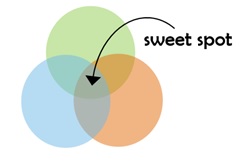Purpose should cause you to be asking yourself “what gets me up in the morning?” instead of “what keeps me up at night?” ~Joey Reiman (author of The Story of Purpose: The Path to Creating a Brighter Brand, a Greater Company, and a Lasting Legacy)
 I believe what makes an organization effective has changed over the past decade. We’ve been using the word “social” in new ways for some time. Facebook launched in 2004, and we’re all familiar with how rapidly it influenced our vocabulary. Being more “social” has also changed our expectations for work.
I believe what makes an organization effective has changed over the past decade. We’ve been using the word “social” in new ways for some time. Facebook launched in 2004, and we’re all familiar with how rapidly it influenced our vocabulary. Being more “social” has also changed our expectations for work.
Author and speaker, Nilofer Merchant, says, “social era rules are both provocative and grounded in reality—they cover thorny challenges like forsaking hierarchy and control for collaboration; getting the most out of all talent; allowing your customers to become co-creators in your organization; inspiring employees through purpose in a world where money alone no longer wields power; and soliciting community investment in an idea so that it can take hold and grow.”
Purpose first started to appear as a topic with some regularity early in the 21st century. Today, a number of the best-selling authors in leadership and business reference or even focus on the significant impact of purpose.
Dan Pontefract, author of The Purpose Effect: Building Meaning in Yourself, Your Role and Your Organization, said, “‘The sweet spot,’ the axis on which talented people gather together to create value through an alignment among three types of purpose: personal, organizational, and role. This central argument is critical, something that successfully expands upon the works of others.”
The benefits of aligning purpose? “When people know the purpose of an organization, they don’t need to check in or get permission to take the next step; they can just do it. When the organization is demonstrating purpose, the likelihood of employees going above and beyond the call of duty greatly increases. When people share in purpose, they will bring their all to the group’s efforts. When organizations stand for something, it brings coherence to everything, and a real advantage to what they offer.” That’s Nilofer Merchant’s perspective on the benefits of purpose.
The strength of organizations today—I don’t think it matters if the organization is for profit, not-for-profit, large or small—is found in its core. Its shared meaning, its values, its purpose—its core. If the core is weak then the organization will in turn also be weak. A strong core can, to a degree, compensate for weaknesses in other areas.
Leaders should enable staff to find their personal purpose, help them connect that purpose to the organization and to their role. That alignment of purpose, or as Pontefract called it, the purpose effect, can transform organizations.
The power of purpose can’t be underestimated. So, what gets you up in the morning?



